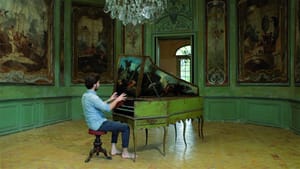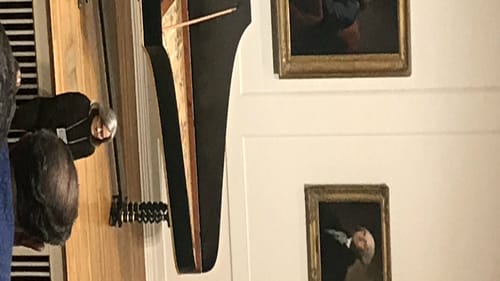Stay in the Loop
BSR publishes on a weekly schedule, with an email newsletter every Wednesday and Thursday morning. There’s no paywall, and subscribing is always free.
Hoping for the harpsichord’s return
The Philadelphia Chamber Music Society presents harpsichordist Jean Rondeau

When did you last attend a solo harpsichord recital? If you answered never, I’m here to tell you that you’re missing out. Philadelphia Chamber Music Society (PCMS) recently hosted its first foray into the genre, presenting the exciting young keyboardist Jean Rondeau at Benjamin Franklin Hall, and his Bach-heavy recital proved a knockout.
Rondeau dubbed the evening Italian Recycling. In true PCMS fashion, an audience member shouted out a question during artistic director Miles Cohen’s pre-performance speech: “What the heck does that mean?” Cohen couldn’t provide an answer—and neither can I, really. But when the results sound as good as they did here, I’m not inclined to linger on vagaries.
The skeleton on the roof?
The harpsichord often gets a bad rap these days, with listeners more often preferring the struck sound of a modern piano to the plucked tinkle of the older instrument. The lack of dynamics might also cause some to think a full recital would lead to monotony. The eminent conductor Sir Thomas Beecham described the sound as “two skeletons copulating on a tin roof in a thunderstorm.” Ouch.
Modern pianists regularly play each entry presented on Rondeau’s 75-minute program, sometimes with revelatory results. Still, the 27-year-old Paris native made a case for hearing them played with period-specific flair.
Baroque without the opaque
Rondeau interspersed Scarlatti throughout the evening: six of the composer’s Keyboard Sonatas, performed with wit and verve. The player favored speedy, spirited tempos, which may surprise listeners who expect a statelier sound from the harpsichord. Yet his approach woke the music up, and the sonatas didn’t end up sounding like background compositions in a costume drama. He gives us Baroque that isn’t opaque.
In the allegro movement of Sonata in A Minor, K. 175, Rondeau lived up to his surname, drawing dancelike rhythms that distinctively contrasted the more forceful opening bars. He called the audience’s attention to individual notes inside a musical phrase without seeming too cerebral about it. That quality followed him to the andante of Sonata in F Minor, K. 481, the most plaintive piece in the group, which sounded like it contained the chill of death among the springier stretches.
Rondeau performed sections containing several works without a moment’s pause, transitioning from Bach to Scarlatti and back again as if their compositions formed a single narrative. One might worry that such a tactic would cause the pieces to blur together, but the keyboardist subtly drew out the differences that allowed the listener to understand where each grouping was going.
Interrupting applause
Of course, Rondeau still let individual compositions stand on their own when necessary. His rendition of Bach’s Italian Concerto in F Major, BWV 971, drew applause that momentarily broke what the artist probably would have preferred to be a seamless transition into the Chaconne from Partita in D Minor, presented in Brahms’s left-hand arrangement. So be it.

Rondeau drew out all the drama one desires from the 15-minute work, establishing a high-stakes narrative through music. He also highlighted the Italian influences on the German Baroque sound without being too scholarly. The achievement deserved recognition.
Yet each piece received special care, from the surgical precision brought to the Prelude from Lute Suite in C Minor, BWV 997, to the spritely energy of the Fantasia in C Minor, BMV 906. The Chaconne, originally composed for violin, offered Rondeau the opportunity to richly texture a short work. Nothing sounded like a bagatelle.
When he comes back
If I had to lodge a complaint, it would only be that I wanted more. (Rondeau favored the crowd with one brief encore, a selection from Poulenc’s Concert Champêtre.) A skilled jazz pianist as well as an early-music virtuoso, Rondeau sometimes combines these two passions on the same program— trading Bach for Duke Ellington after an intermission.
When PCMS brings him back—and they surely will, given the enthusiastic reception from the sold-out audience—he should consider doing just that.
What, When, Where
Italian Recycling. Program of Scarlatti and J.S. Bach. Jean Rondeau, harpsichord. Philadelphia Chamber Music Society. March 1, 2019, at the American Philosophical Society’s Benjamin Franklin Hall, 427 Chestnut Street, Philadelphia. (215) 569-8080 or pcmsconcerts.org.
Sign up for our newsletter
All of the week's new articles, all in one place. Sign up for the free weekly BSR newsletters, and don't miss a conversation.
 Cameron Kelsall
Cameron Kelsall